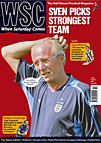 After another incident-packed transfer window, is there any shred of club loyalty left?
After another incident-packed transfer window, is there any shred of club loyalty left?
If Chelsea were going to make Lyon an offer for Michael Essien they couldn’t refuse, you would think they could have hurried up about it a bit. Far too much newsprint was expended on a depressingly inevitable saga. Lyon’s point of view – that if they were going to lose their best player to a team with a bottomless pit of cash then they would take every rouble they could get – was understandable. Essien, too, cannot be blamed for wanting more money than he could dream of
But as well as being very boring for the reader, the tale also showed football to be more than ever a simple question of money. Whoever has the most – especially when the gap between rich and poor is so great – possesses an insurmountable advantage in most contexts, especially in league football.
Essien has the quality to make himself a fixture in the squad – this is why Chelsea wouldn’t take no for an answer – but that isn’t true of all their signings. Jiri Jarosik, for instance, signed in January, farmed out in August. He isn’t the first and won’t be the last “Chelsea” player under Roman Abramovich who makes more appearances for other Premiership clubs while on the Blues’ books.
The Premier League no longer allow players on loan from one club to another to play against the team that owns their contract. There are strong reasons for arguing that no loans within the same division should be permitted: a team with more internationals in their reserves than many have in their first teams can farm them out, bolstering the challenge to their rivals; at the same time, the absence of loan players means you get to face weakened opponents. Chelsea are far from alone in this: how will West Brom cope without their first-choice goalkeeper, who has done well enough to earn an England call-up, when Chris Kirkland cannot play against Liverpool? But the rules are, for this season at least, the rules. And it is still possible that Jiri Jarosik and Michael Essien will meet as opponents in 2005-06.
During Euro 96, an American visitor to one of the FSA’s fans’ embassies asked “How do players decide who to play for? Is it the team that gives them the most money?” Essien will play for Ghana in Germany next summer if they can get four points from their last two games in their qualifying group, which will be over by early October. Jarosik, if the Czech Republic either overtake Holland or win in the play-offs, will play for the Czech Republic. It’s that simple.
The World Cup is now a huge commercial operation. The allocation of places to the different continents is a highly political business with great financial penalties for those who miss out as a result of the horse-trading. Those countries that can spend more on training and facilities have a substantial advantage over those struggling to scrape together air fares. Despite the recent returns to action of Luis Figo, Zinedine Zidane, Claude Makelele and Lilian Thuram, some top stars have quit the international game for the sake of their club careers: Pavel Nedved must have some fearsome mortgage payments to keep up.
None the less, at a time when league football at the highest level is increasingly predictable, the international game offers genuine doubt and excitement as to the outcome and, while some players opt out, loyalty is rarely in question and quickly settled.
The Champions League, since the abolition of the second group stage, offers unpredictability and therefore heightened interest from the last 16 onwards. The collection of stars benefiting from cohesive club values means that many see this as a higher level of play than you see in international football today. But you still have players with divided loyalties and only a few clubs (generally those widely loved yet also loathed) are involved. You also get only 290 knockout-stage games across three months.
However much of a procession the league season becomes, there is some light at the end of the tunnel: four weeks in Germany in 2006, 63 real games, with only a handful of mismatches. Even then, the chance and value of a shock across 90 minutes, when the league campaign consists of only three games, are far higher than in the Premiership.
Excepting those odd rumours about Argentina and Peru in 1978, the World Cup cannot be bought. And that is what makes it priceless.
From WSC 224 October 2005. What was happening this month